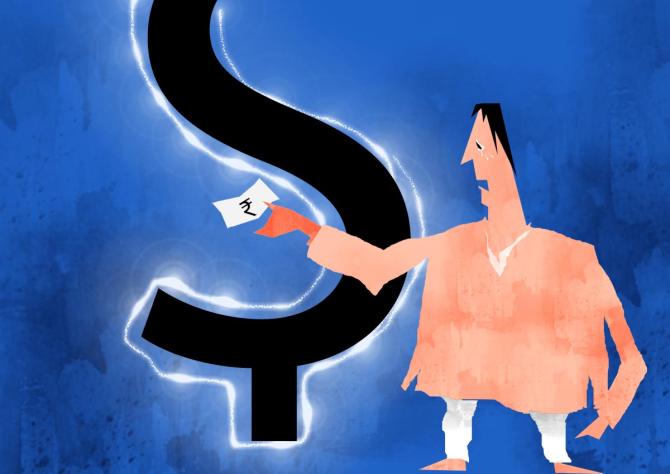Industry experts say the rupee's record low last week presents an investment opportunity for non-resident Indians (NRIs) and global capability centres (GCCs).

While firms like KPMG, Emkay Global, CRISIL, and Anarock see potential gains for overseas investors, they also caution about the challenges ahead if the rupee's fall continues.
Real estate consultancy Anarock noted that a depreciating rupee lowers property prices for investors converting from stronger currencies like the dollar or the pound.
This creates attractive opportunities in the sector, with the added potential for asset value appreciation when the rupee strengthens.
However, the rupee's depreciation has its downsides as well. Santhosh Kumar, vice-chairman, Anarock Group, said, “While a weaker rupee makes Indian real estate more affordable for buyers using foreign currency, it poses challenges for NRIs earning in rupees.
"High property prices and the risk of currency fluctuations can impact investment value, introducing uncertainty and potential financial risks.”
Analytics firm KPMG highlighted the declining value of the rupee as a significant incentive for NRIs to invest in the sector.
With a weaker rupee, the demography can now purchase property with a reduced dollar outlay or secure larger spaces for the same investment.
Adding to the appeal, the rising presence of professional real estate agencies in the country is streamlining property rental and management services.
This development allows NRIs to efficiently manage their investments, even while residing abroad, bolstering confidence in the market.
Commenting on the concerns, Chintan Patel, partner – deal advisory and head – building, construction and real estate, KPMG in India, said, “If the rupee continues to depreciate further, the only concern would be what happens when they exit the investment and try repatriating.
"It may erode all the potential value appreciation in rupee when converted back to an even stronger dollar.
"The other issue with real estate as an investment is the material transaction costs — registration and stamp duty, among others.”
On the other hand, CRISIL highlighted that investment by GCCs in India is expected to increase.
“Depreciation of the rupee will be viewed favourably by NRI investors in the high-end luxury residential segment. It will also further improve GCC investment prospects in India and fuel India's office growth story.
"A stronger dollar may also lead to improvement in private equity/institutional investment inflows in the real estate sector,” said Aniket Dani, director - research, CRISIL Intelligence.
On the flip side, however, Dani said that the depreciation of the rupee is expected to exert pressure on input costs — such as steel and cement — as well as the cost of capital for real estate in the near future.
He added, “This will have an impact on supply and capital value trends. It may also impact affordability for mid-to-affordable residential segment demand.”
Throwing light on the depreciation, Riya Singh, currency and commodities analyst, Emkay Global Financial Services, said, “By presenting real estate expenditure in a supportive way in the upcoming Budget, we can expect a significant boost to overall infrastructure.
"For the economy to gain momentum, we need to see stronger inflows in FY24 and a return on investments in the market.
"We are anticipating a further decline in the rupee, hitting 87 against the dollar.”
Historically, the rupee dropped 3.79 per cent to Rs 86.47 on January 23 from Rs 83.19 on October 23, 2024, against the dollar.
Other weaker currencies include the Indonesian Rupiah, South Korean Won, Japanese Yen, and others.












 © 2025
© 2025